Honoring Student Voice is Easier Than You Think with Monica Burns

Well hello there teacher-friend and welcome back to the Sustainable Teacher Podcast where we talk about all things sustaining daily teacher-life so we don’t have to spend our evenings and weekends working, and yet are still effective in the classroom.
Today I am excited to welcome Dr. Monica Burns of Classtechtips.com onto the podcast. Monica is a former New York City teacher and edtech expert that is now sharing her edtech expertise with schools and teachers around the world. Her focus, both on her Easy EdTech Podcast and many publications, is to infuse technology for engagement and differentiation in order to simplify and streamline the technology integration process.
Monica is here today to talk about student voice and creativity, and how technology can help us elevate both of those important aspects of our classrooms, particularly in the flipped classroom.
I just know you will leave today’s episode with some great ideas and maybe even a new tool to try but not because the to...
Teachers Aren't Teachers

Have you ever heard the phrase that the best way to learn something is to teach it? Or have you ever, instead of you, yourself teaching a concept, had your students take over to teach it because you knew they would have to learn it first?
You’ve experienced this yourself. The only way to be able to teach something is to learn it first. And this is why teaching can be so hectic, especially if you’re told you’re teaching a new subject or course within your certification. First you have to learn it, then you have to get into the complexities of best practices in teaching that specific content. Talk about time consuming, right?
But what if it didn’t have to be that complicated?
What if we approached it not as a teacher, but instead as expert learners?
In this episode I’m diving into how teachers are not teachers, they are expert learners of their specific content, because gone are the days where you can just talk at kids and expect them to absorb everything you say. Kids just d...
What’s Behind Teacher Self Talk?
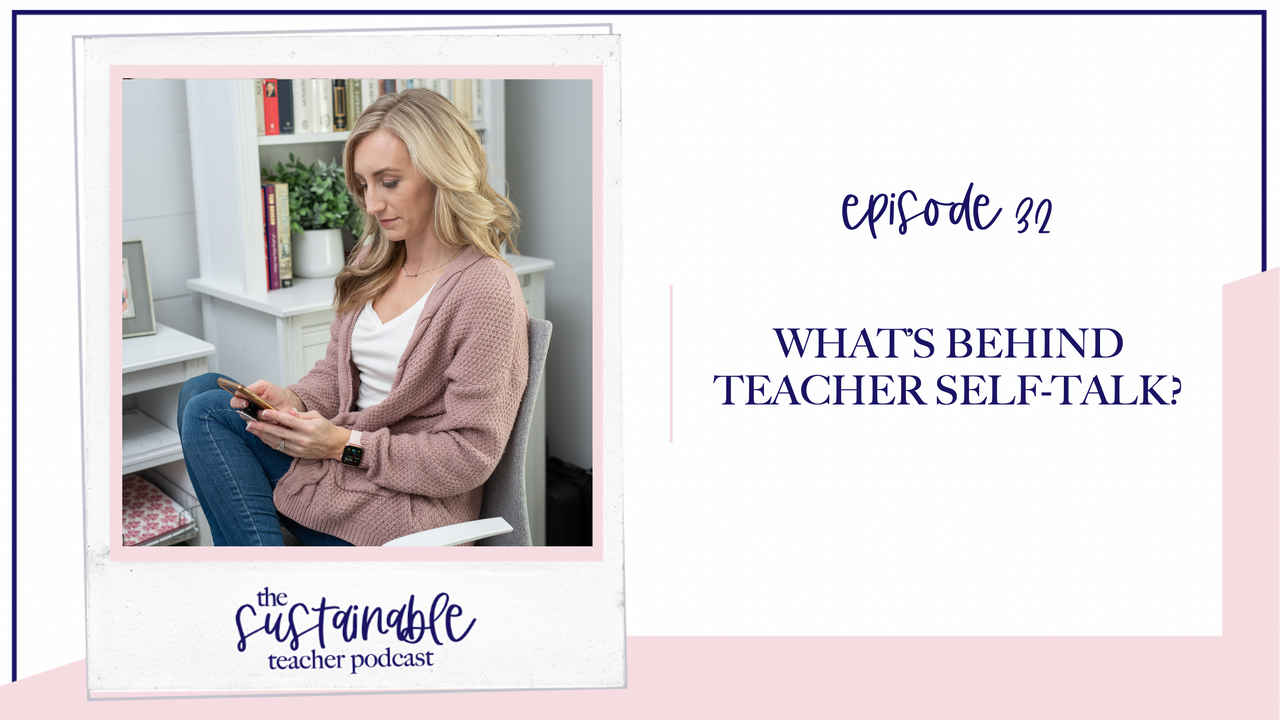
I was doing a Facebook Live not too long ago, and at the end as I was trying to convey to teachers watching that I too am a teacher, working for myself now, reaching out to teachers with my message of teacher sustainability, and I caught myself saying “I’m just a teacher.” And although I meant it in an endearing, relatable way, it still didn’t sit well with me that the word “just” wanted to creep in there.
Adding the word “just” means I’m nothing more than, or I could’ve done more with my life, but instead I’m “just” a teacher.
Have you ever caught yourself saying this or something like this? Maybe in a circle of friends who aren’t teachers?
Or how about this common saying, “Those who can, do. Those who can’t, teach.”
Now, that’s just a saying, but it’s one we’ve all heard, and I’m sure had aimed at us in some way before even if it was in a joking manner. But I bet it wasn’t laughable.
In many ways I think teachers have assumed these beliefs about teachers, and almost absor...
Flipped Classroom Success Stories
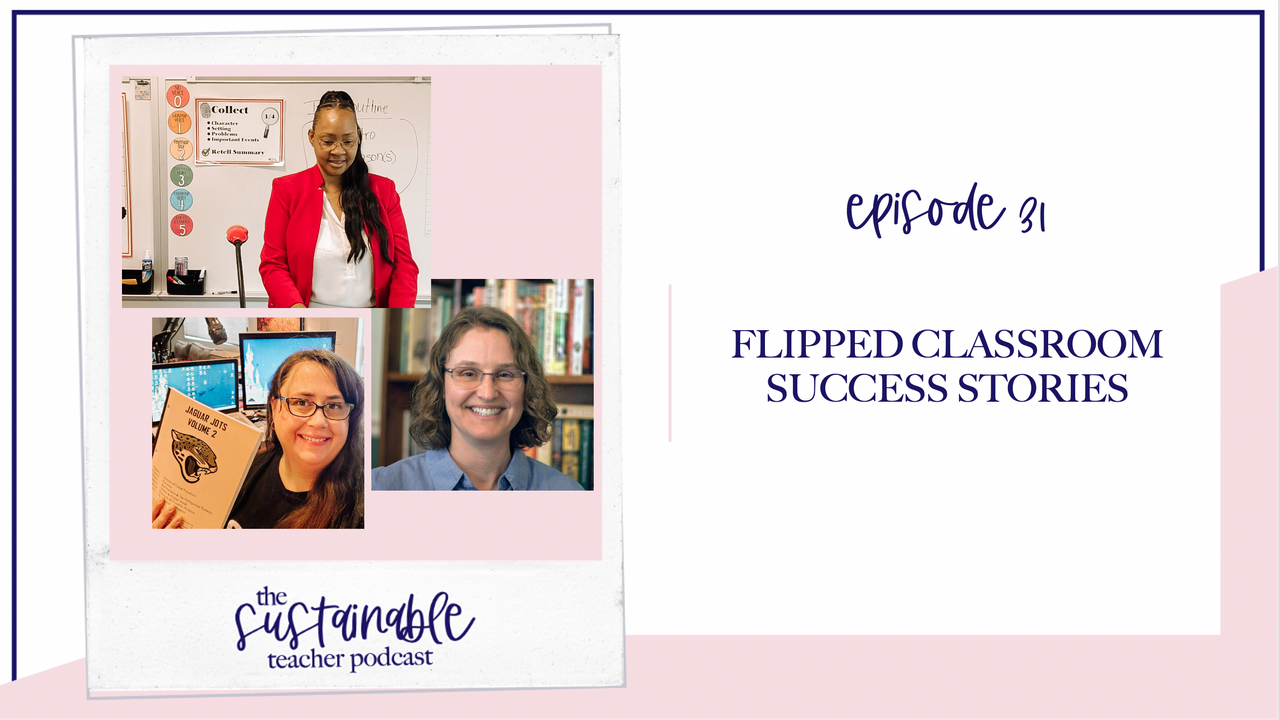
Brenda in 4th grade, Keri in 7th grade math, Jessica in high school chemistry, Megan in Algebra 2, and Charles in high school ELA… all are teachers who flipped their classrooms this past school year and are now on the other side of their hard work reaping the rewards of the flipped model and ready to share their own and their student success with you.
I’m compiling experiences into this one episode and hope that the stories shared allow you to see the possibilities for your own classroom and daily teaching life.
After listening to this episode you’ll be inspired by the success teachers of the flipped classroom have found, and see yourself in their transformation, knowing that this time next year, your classroom or student success story will be told.
Let’s get to it.

Before we get started I want to point you to a resource that I think you’ll love seeing and that is all of the stories I’m going to be sharing with you today and WAY MORE are available to you and anyone else who wan...
Overcoming the Game of Grades with Your Students

I’m betting you’ve had a student come to you at the end of the semester or grading period to ask if there’s anything they can do to improve their grade, and your answer is, yes, you could’ve cared and done your work months ago - but caring now is too little too late.
Or maybe you’ve had a student come to you about how they were only one or two points away from an A on the test, after you had already slightly rounded up their score, and now they were asking you to round it up more.
I’m betting you’ve had any number of experiences like these whose true, underlying meaning is that the student cares more about the grade they receive in your class than they do the learning experience.
This is not a one-classroom, one-school, or one-region issue. This is a systemic, culture-wide issue inside of education that I will say, I’ve seen some improvements in over my years in the classroom, but I’m not sure will ever truly go away.
I mean it when I say that I don’t think the game of grades w...
Responding To Learning Gaps Left By 2020

Now that the 2020-2021 school year has come to a close, we can all look back and realize the race it was to lessen the ramifications and decrease the learning gaps created by the shutdowns that occurred in the spring of 2020.
And when I say it was a race, I mean it was a rat race, with tons of hurdles, obstacles, disqualifications, delayed starts, and crap on the track and anything else that symbolizes hardship in our foot race analogy here.
Learning and achievement differences have always existed, but the shutdowns of 2020 put all kids’ learning in a jar, shook it up, and laid it out for us to clean up. And here’s a big takeaway for today’s episode… That clean up process is not finishing as we end this school year.
We will notice those learning gaps indefinitely. And we must respond in-kind.
So as we reflect on how to close these gaps, let’s do so with the facts in mind that
- This is a long game, and gaps will not close in one year, so let’s prepare our classroom and diffe...
The End Game of a Sustainable Teacher

Hi teacher-friend, I am Mandy Rice, if you don’t know me, I am the host of this podcast that I hope you’ve come to enjoy on your commute or maybe are brand-new to, and I’m glad you’re here to hear me out on this episode. So, like I said, Hi, I’m Mandy, and I am control freak. I am also a work horse, and am productivity obsessed.
Now, I’m sharing these things about myself because maybe you can relate, especially in your career and daily teacher-life, but also because I want you to know that as much as I preach streamline, reduce, fight for your own sustainability, I want you to know that when I say these things, I’m also speaking directly to myself.
Working for your own sustainability is a journey, not a destination. Meaning we will never arrive at one place where we look around and realize, “Ok, yes, my daily life is sustainable now.” I don’t know, maybe we will, but I for sure know that if we can say that to ourselves, we won’t last if we don’t continually do the work to prio...
3 Summer Must-Dos for a Sustainable Teacher & Parent

Hello there and welcome to the Sustainable Teacher Podcast, where we chat once a week about all things keeping our lives manageable so that we can do the things we love longer, particularly teaching. In this episode, I’m going to take a little break from the normal teacher-specific talk, and focus more on another important aspect of our lives, and that is our homes. More specifically, I’ll be getting a little personal and sharing some specific things that I’ve been working on lately in my home and personal life to reach for a bit more sustainability. And I hope you find them valuable.
After listening to this episode you’ll know three ways that I’m making our homelife a bit more manageable, so that you are inspired to reflect on and possibly implement any of the strategies as you strive for more sustainability in all aspects of your life.
Let’s get to it.

Summer Bucket list
As we are quickly approaching summer, I don’t know about you guys, but I’m getting a little overwhelmed...
What Is Summer to a Sustainable Teacher?
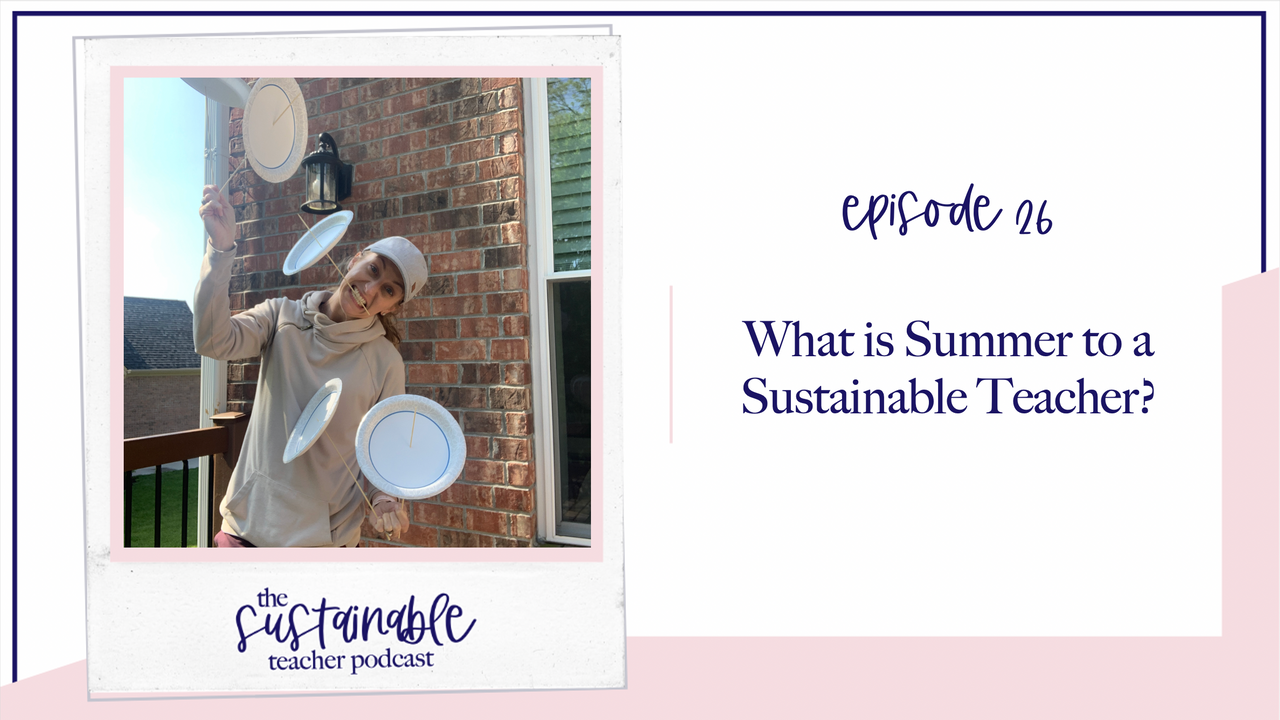
I have an analogy for you that will take us through the duration of this episode. Here it is. Throughout the school year, we each have multiple spinning plates in the air as teachers and as human beings. Each facet of our life is one spinning plate, and it’s our job to keep them spinning and in the air lest they drop and shatter.
Summer break, then, is a time for us to put down all the educational, teachery plates we keep spinning for 9-10 months of the year so that we can focus on other plates. Summer is an incredible thing for teachers - this is no news to you - but truly, it is time for us to refuel and rejuvenate in whatever aspect of our life we want.
In this episode I’d like to offer some food for thought on how we can use summer to fuel our sustainability throughout the year. Hence the title What is Summer to a Sustainable Teacher. So stick around areas within this topic that we’ll be pondering and discussing today, and if it’s an episode and a message that you’re lo...
Don't Do This ONE Thing in Your Classroom
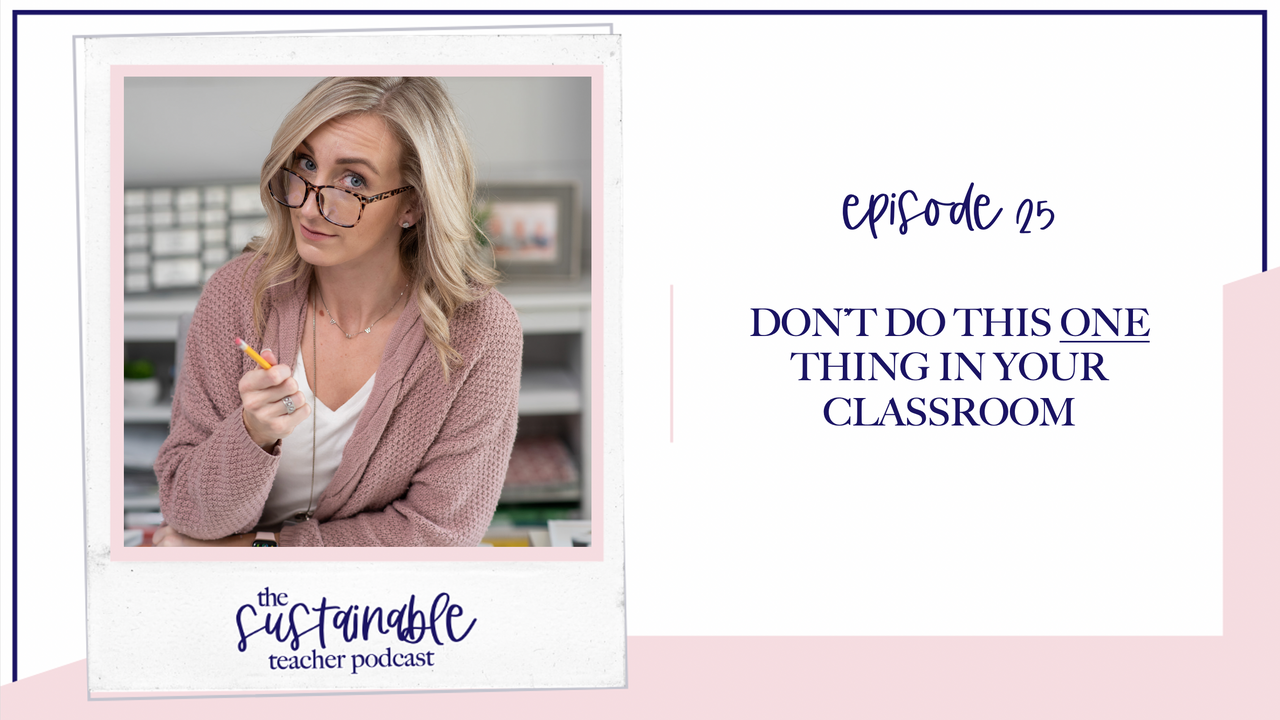
As teachers (and humans, really), we are provided with steps and formulas to follow in implementing great strategies, fixing our classroom management, and all other things teacher-life, at what seems like every turn. And I knowingly contribute to this, although I hope that my advice is valuable and helpful, but in this episode I hope to provide you with something NOT to, multiple steps NOT to take when it comes to improving upon and implementing strategies in your classroom.
And it really comes down to one piece of advice.
After listening to this episode you will know this ONE thing you shouldn’t do in your classroom because in not doing iit you’ll serve your own sustainability and your effectiveness with your students. You’ll feel empowered and ready to take next steps in strengthening your sustainable teacher-life.
So let’s get to it.
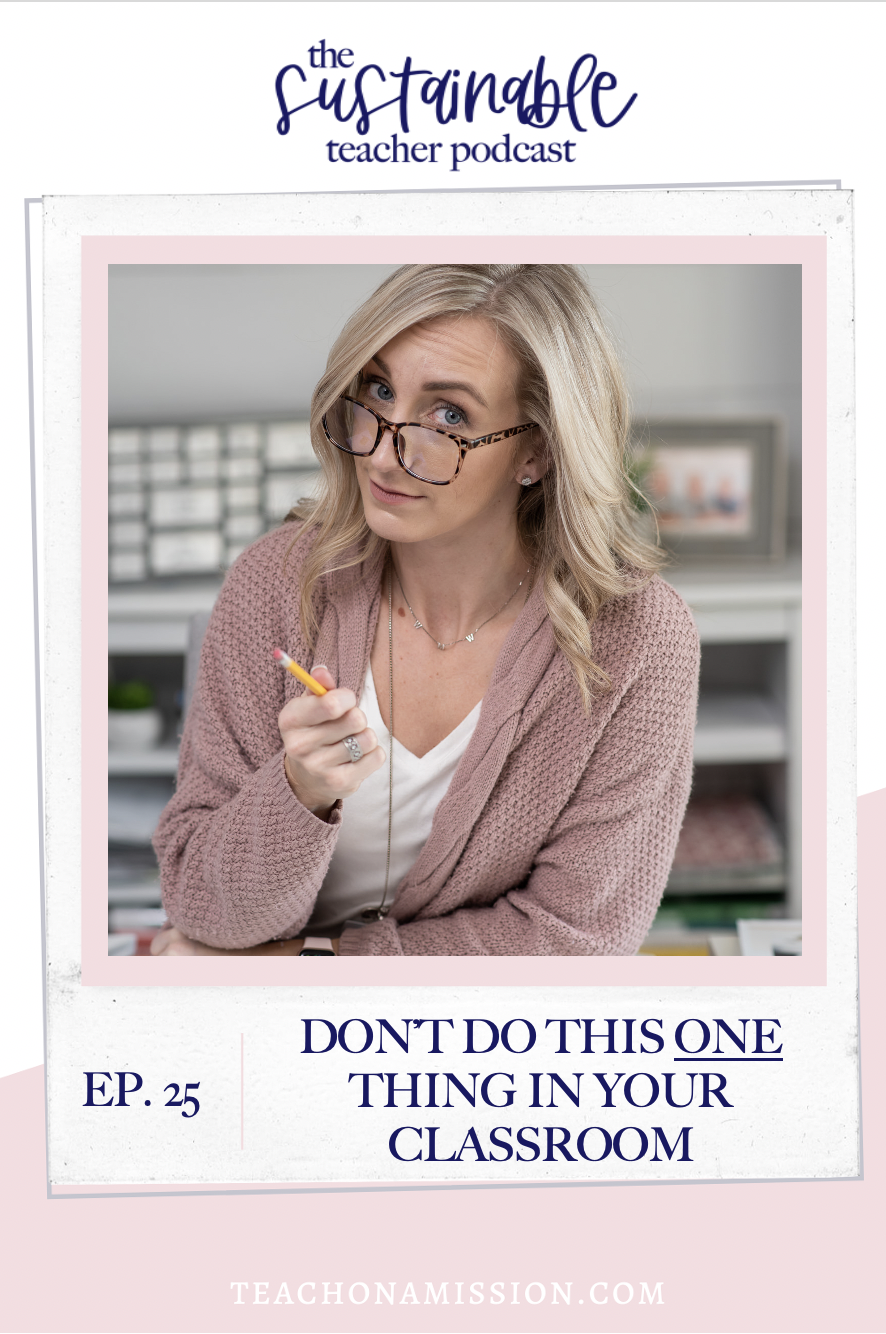
Picture this teacher-scenario really quickly. You want to make a change in your classroom, and regardless of what it is, you either don’t a...


